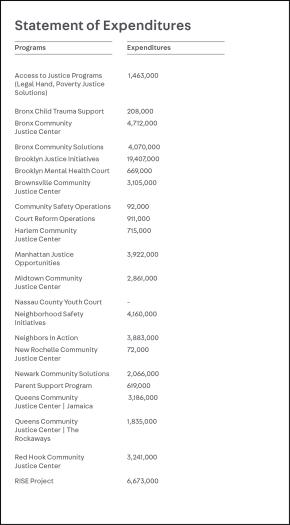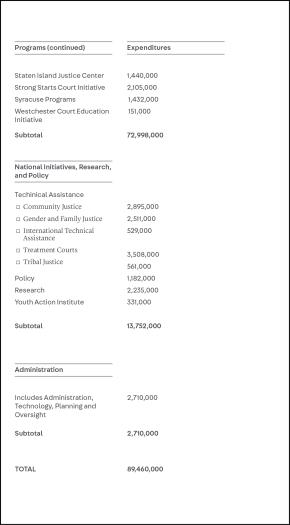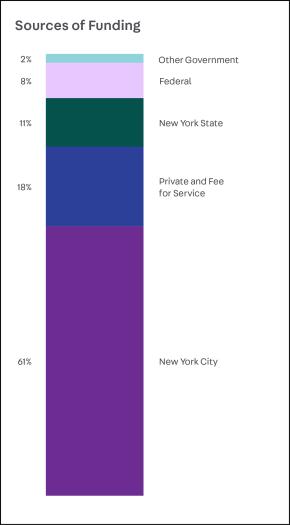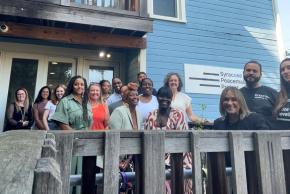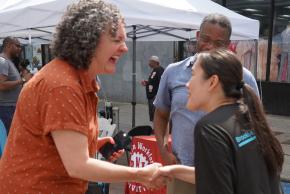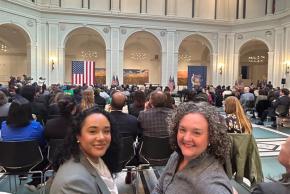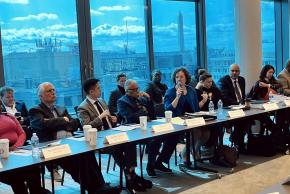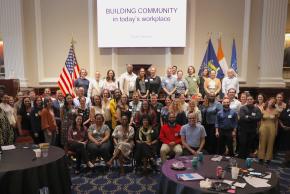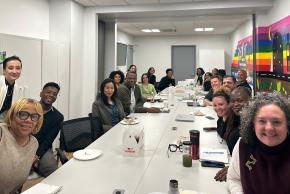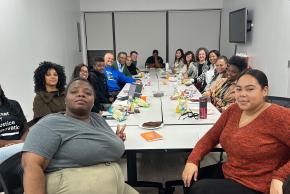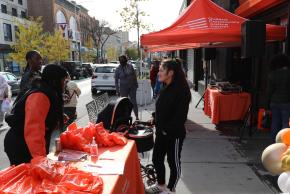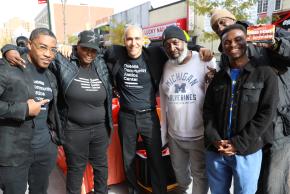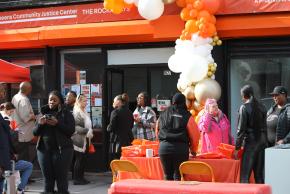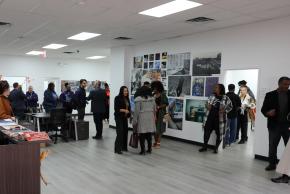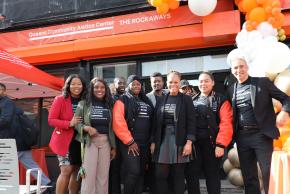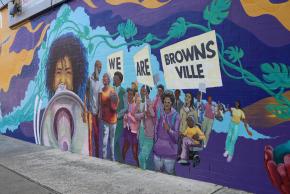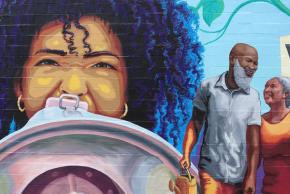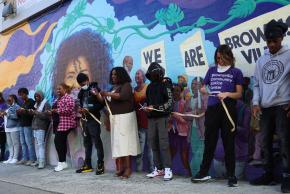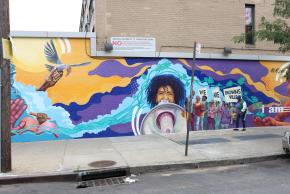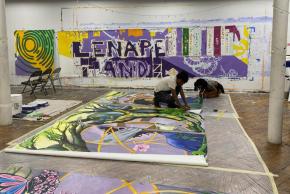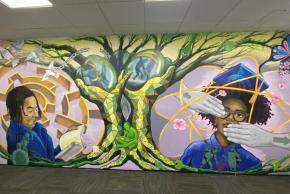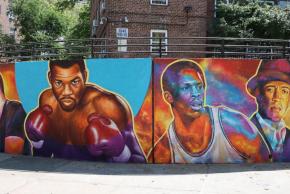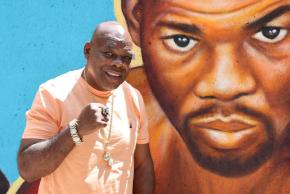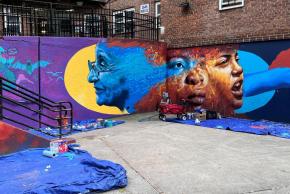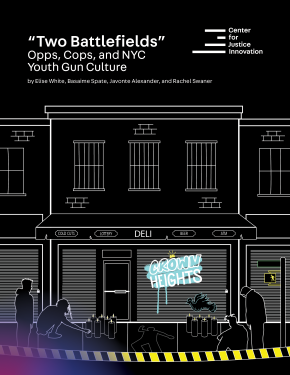
Letter from Our Executive Director Courtney Bryan
Sometimes you can only be sure you’ve made the right move after you’ve made it. That’s what happened when we changed our name to the Center for Justice Innovation. We did the planning and research. We held focus groups with staff and others, consulted marketing experts, and took time to reflect.
But it wasn’t until we announced our new name publicly in January 2023 that we were certain we’d made the right choice. The positive feedback we received was immediate and universal. “That makes sense.” “I love it.” “It couldn’t come at a better time.”
In language terms, the change wasn’t big. We swapped out the word “court” for the word “justice,” leaving the other three words untouched. But in idea terms, the change was monumental, reflecting 27 years of impact and growth.
Apropos of an organization with innovation in its name, we’ve been evolving since the day we were founded in 1996. We began by working with the New York State Unified Court System to implement new, evidence-based ideas to reduce unnecessary incarceration, support victims, and make communities safer. Over time, we partnered with other parts of the justice system and with communities, particularly those most impacted by crime and disinvestment. We also grew geographically—from a focus on New York City, to other parts of the state, New Jersey, and California—and we fostered a team of researchers and experts who support people interested in developing their own local reforms across the country and around the world.
As we grew, we recognized that to achieve true justice, we needed to work “upstream,” finding new and better ways to keep people out of the legal system with programs that put people first and build on their strengths. We believe justice has many facets, starting with safe streets, economic mobility, vibrant schools, stable housing, and resources to address the kinds of life challenges—such as mental illness, substance use, and family violence—that all communities face.
But justice isn’t only about healthy, vital communities. It’s also about fair and effective policies that reflect the views of those affected by crime and the legal system. That’s why we engage in “participatory” activities, such as a participatory budgeting, which empowers local residents to decide for themselves how to spend city funds to build safety (see below under “Promoting Economic Justice”) and participatory action research, which welcomes community residents to join our staff as researchers (look under “Changing Narratives”).
We also prioritize racial justice. One way we advanced racial justice in 2023 was in partnership with the MacArthur Foundation by working with four jurisdictions to identify and address drivers of racial inequities in the legal system and broader community. We also sought to empower survivors by partnering with national groups to build a framework for professional development and support for those who have experienced human trafficking to help them become leaders and advocates.
Our community-focused work takes many forms. Last year, we launched new programs to help families avoid eviction, started a street outreach program in our Upstate office to reduce drug overdoses, and opened new justice centers in the Bronx and Queens to train local residents as leaders, expand opportunities for young people, promote economic mobility, and serve as incubators of new community-driven initiatives to foster community health and resiliency.
Also in 2023, we deepened our commitment to making the legal system fair and humane by, for example, taking on citywide responsibility for Project Reset, a pre-arraignment diversion program that offers those who commit low-level offenses community programming in lieu of going to court, and advocating for more funding for Supervised Release to ensure people facing charges receive services safely in their communities rather than experience the lasting harms of incarceration. We also advocated for and will play a big role in the work of a new Lippman Commission to help the city fulfill its commitment to closing the jails on Rikers Island.
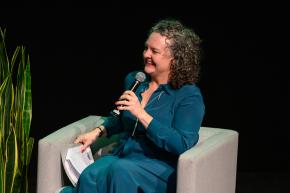
Information is key to promoting new, more effective ways to do justice. One way we do this is through original research. In 2023, our research team analyzed what we know about drug treatment courts and recommended new areas to study to provide the best possible outcomes for participants.
As I wrote when we announced our new name, the word “justice” incorporates our legacy of court-based innovation while making room for our values—equity, fairness, humanity, and community empowerment. Ultimately, the term justice is spacious, with room for people to define what justice means for themselves, their families, and their communities.
Our name may have changed but our goals remain the same: empower communities, foster fair, effective, and humane systems, and ensure safety and justice for all.
Courtney Bryan
Executive Director
Letter from the Chair of the Board of Directors, Rasmia Kirmani
The Center for Justice Innovation is a remarkable organization—and I’m not saying that because, as Chair of the Board, I’m supposed to say that. I’m saying that because I know from long experience it’s true. I’ve been privileged to interact with the Center throughout my career, having worked closely with its inspired staff on numerous projects and witnessed the profound positive impacts it has had on people and policies over 28 years.
In 1995, when I was a 22-year-old receptionist at the Times Square Business Improvement District, I met the people who would found the Center the following year. These folks were already drawing national attention for launching the Midtown Community Court, which had begun changing the script on how courts respond to crime. They showed that by offering services that address the underlying factors that contribute to crime, rather than issuing fines and jail sentences, they could increase public safety, improve lives, and reduce the use of incarceration.
Years later, as head of the Brownsville Partnership, I worked closely with the Center staff that planned and launched the Brownsville Community Justice Center, and as an advocate for public housing, I have partnered over the years with the Center in its efforts to empower tenants and fight for housing justice.
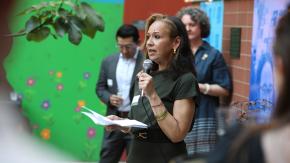
I believe in the Center and its mission to build safety and racial justice while centering the people most impacted. As you’ll see in the following pages, the Center is continuously pushing the envelope, moving beyond the legal system to empower communities—especially those impacted by disinvestment, crime and systemic bias—with the tools and resources to create safety and justice with solutions that foster opportunity and hope while reducing the harms of the criminal legal system.
I am so grateful to our donors, partners, staff and communities for their contributions to this amazing enterprise. I hope you find the accomplishments in our annual report inspiring and continue to follow our work as we push the envelope further in the years to come.
Rasmia Kirmani
Chair of the Board of Directors
Our Approach
Justice is more than a verdict handed down in a courtroom. It is a living ideal, built and embodied every day by dedicated, passionate people.
We rightly often focus on where justice is absent—in overfilled prisons, racialized policing, and neighborhoods impacted by disinvestment. But we must also ensure we are looking for where justice does exist—in our homes, our schools, our courts, and our communities. During our nearly 30-year history, the Center for Justice Innovation has embraced justice everywhere it can be built, from reimagining courts as places that foster healing, to ensuring that people and families have access to homes, economic opportunities, and all of the other elements of safe and strong communities.
Justice in Health, Family, and Housing
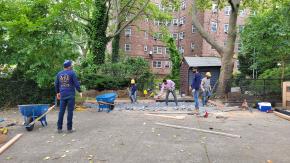
Justice can begin with the simple, everyday things we rely on for safety and well-being: affordable homes; good mental health care; families and support networks with the resources they need to thrive. Our nation’s legal system overwhelmingly affects people who have struggled to have these basic needs met, often due to systemic underinvestment in Black, Brown, and low-income communities. The only way to build a fair and humane legal system and strong, healthy communities is by addressing these inequities head-on, both inside and outside the system.
Working for Stable Homes
Having a safe, stable home is the foundation that helps people and families thrive in their work, education, and personal lives. The Center operates a wide range of initiatives to help ensure people can stay in their homes—preventing the harms of eviction, increasing access to justice in housing court, and getting tenants the resources they need to assert their rights.
Our Housing Resource Centers in East Harlem and Brooklyn’s Red Hook neighborhood are open to all residents facing the threat of eviction, struggling to pay rent, or needing crucial services like home repairs. In addition to providing legal and financial assistance, our Resource Centers connect community members to services for other needs that might contribute to—or be exacerbated by—housing insecurity, from help navigating public benefits to referrals for mental health care, employment, and victim services. This year, our Housing Resource Centers worked with about 2,000 residents to help them remain safely, affordably housed.
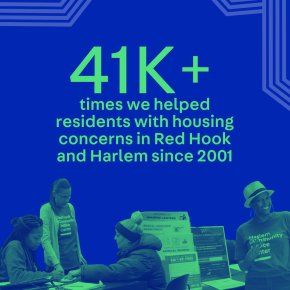
With New York State’s Office for Justice Initiatives and the New York County Housing Court Clerk's Office, we launched the Virtual Court Access Network, connecting residents of the East and Central Harlem communities to housing justice. Rather than traveling up to an hour to Manhattan's housing court downtown, residents can go to the Resource Center in their community to virtually respond to eviction notices, initiate actions against their landlord for home repairs or harassment, or seek more time pending an imminent eviction. Nearly 200 tenants used the Virtual Court Access Network at the Harlem Community Justice Center in 2023.
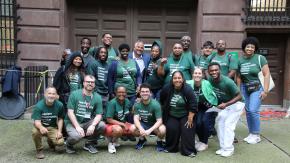
Our Harlem Community Justice Center held its second annual Housing Resource Fair, bringing 20 organizations together to support nearly 300 residents with home repairs, rent, legal challenges, and more. Another resource fair we hosted in Lower Manhattan served as a one-stop-shop for people to find help with employment, housing, and healthcare while enjoying free food and music in Foley Square.
To prevent the devastating harms of eviction, we worked closely with the court systems in New York and New Jersey to provide emergency relief, legal guidance, and referrals to supportive services for tenants at risk of losing their homes.
342 tenants assisted in Brooklyn and Suffolk County through the Eviction Diversion Initiative in 2023
1,000+ households offered eviction prevention services in Essex County, New Jersey
$280k+ in emergency funds distributed to Essex County, New Jersey residents to cover rental arrears
Far too many people come into contact with the criminal legal system due to underlying mental health needs, which are often exacerbated or left unaddressed by traditional responses. For more than 25 years, we have worked to reduce crime and help people lead healthier lives by connecting them to long-overdue care, both inside the court system and—in recent years—even before they have been arrested.
Putting Care First
The Brooklyn Mental Health Court, which we helped launch in 2002 in partnership with the New York State Unified Court System, offers people with serious mental illnesses pathways out of the legal system and into community-based treatment.
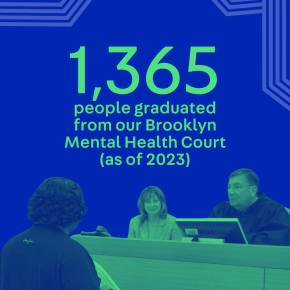
The Brooklyn Mental Health Court welcomed 135 new participants this year, many of whom have been charged with serious offenses and might otherwise face time in prison. New York State’s landmark Judicial Task Force on Mental Illness called on our Brooklyn court team to help transform how communities—and the legal system in particular—respond to mental and behavioral health crises.
The Misdemeanor Mental Health Courts we help staff in Manhattan and Brooklyn offer connections to treatment, housing support, job resources, and other services for people with mental health needs accused of low-level charges. Upon completing the program, many participants have their charges dismissed, potentially avoiding the lasting harms of a criminal record while receiving referrals for ongoing support in their communities.
Through 2023, we have provided supportive, alternative programming in 290 cases through the Misdemeanor Mental Health Courts in Brooklyn and Manhattan.
As vital as it is to address the mental health needs of people already in the legal system, no one should have to be arrested in order to receive care. That’s why navigators with our Community First program reach out to people facing housing insecurity in the Times Square area with clean clothes, health and hygiene supplies, overdose prevention kits, and other vital resources. By centering each person’s agency and slowly building trust, our team helps to sustainably connect people to longer-term services for mental health, medical care, and housing.
2023 marked the 30th anniversary of the first program we helped launch, the Midtown Community Court, which now has a new name: the Midtown Community Justice Center. With decades of experience providing restorative pathways for people who have been arrested, the program now also offers a diversion program in Family Court for teenagers arrested for weapons possession, street outreach with Community First, and community engagement initiatives in Manhattan’s Straus Houses.
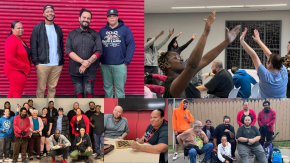
Our new Westside Community First team in Syracuse, New York, takes a similar approach, offering hygiene supplies, sexual health resources, and overdose prevention kits to people living in areas with high rates of substance use.
See footage from our 30th anniversary celebration!
Fostering Thriving Families
Strong families and support networks are the glue that hold thriving communities together. Our Staten Island Justice Center opened a new Family Enrichment Center this year where families can find support from their peers and assistance with vital needs like parenting challenges and career development. Known to residents as “the Spot,” the Family Enrichment Center hosts holiday and birthday celebrations, offers free laundry services, and is home to a community closet used by as many as 100 residents each week.
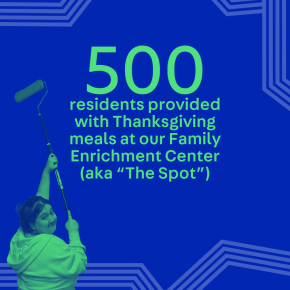
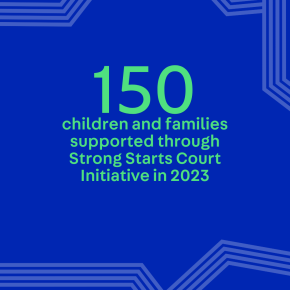
For parents and children involved in the legal and child welfare systems, we provide individualized care to build healthy, thriving family relationships. We support young children and their parents through the Strong Starts Court Initiative, which brings an infant mental health perspective to Family Court proceedings in order to disrupt cycles of trauma and system involvement. Strong Starts operates in all five boroughs of New York City as well as Westchester, and will be expanding to Erie County in May 2024. In partnership with the New York City Office of Child Support Services, we also launched our Young Parent Initiative, which connects young parents with peer supports to promote healthier relationships and address social and financial barriers to caring for their children.
Building Strong Neighborhoods
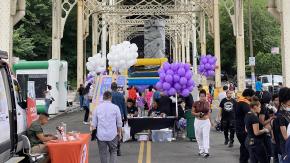
At the neighborhood level, justice looks like shared economic opportunity, safe and vibrant public spaces, and residents with the resources and skills they need to resolve common challenges together. At the Center, we work in both courts and communities to foster strong neighborhoods that are supported, not harmed, by our legal systems. Our Community Justice Centers around New York City offer safe, supportive spaces where residents can access services, find opportunities for healing and growth, and be in community with each other. In 2023, we opened new Community Justice Centers in the Bronx and Far Rockaway, Queens, each serving as a hub for community-driven initiatives and supportive services for kids, families, and people navigating the legal system.
Promoting Economic Justice
No one can thrive without access to the resources and opportunities they need to find meaningful jobs and stable careers. Helping people build skills and knowledge to find lasting employment has been a long-standing component of our work in the legal system, which disproportionately impacts communities that have historically been locked out of economic opportunities. We also help build economic justice in neighborhoods that have experienced disinvestment by providing residents with job training, offering educational support, and investing in young people’s talents. We help young people and adults develop their skills, receive certifications, and build the experience they need to find secure, well-paying jobs.
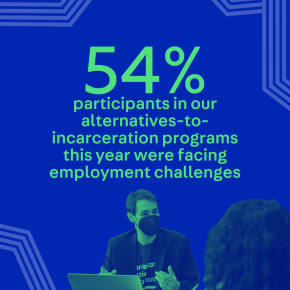
We also foster economic development by supporting participatory budgeting projects, empowering residents of New York City public housing to collectively decide how to invest resources into their own communities. With the support of our Neighborhood Safety Initiatives team, more than 20,000 residents across 30 public housing developments citywide collaborated to decide how to invest $30,000 into their respective communities.
Our new Level Up program addresses barriers in employment, financial literacy, and economic opportunity for young people and adults in Red Hook, Brooklyn and surrounding areas. With deep roots in the community, staff at our Red Hook Community Justice Center helped 68 residents start their career journey in their own neighborhood this year with job training and career development services.
In the Bronx, we helped young people build skills in digital media, photography, entrepreneurship, public speaking, and DJ’ing to set them up for a range of creative career paths.
Meanwhile, our Queens Community Justice Center teamed up with the City Parks Foundation and the Liberty Collective Learning Garden to offer paid work experience to young New Yorkers through the Summer Youth Employment Program. After learning to tend and maintain a local community garden, the youth cohort worked with a teaching artist from Creative Art Works to design a mural for the garden’s plaza.
Cultivating Beauty, Meaning, and Community
Vibrant public spaces foster an atmosphere of safety, joy, and togetherness. In neighborhoods across New York City that have historically faced underinvestment, we support residents and young people to reimagine neglected public spaces as beautiful expressions of community. In Brownsville, Brooklyn, we teamed up with Groundswell NYC to support young artists in designing a new mural for the Marcus Garvey Apartments, reflecting weeks of collaboration and thoughtful discussion about social justice issues that affect their community. Another project we helped organize culminated in a community-led mural alongside the Bronx’s Patterson Houses, activating the building’s exterior with colorful portraits of the houses’ residents, young and old.
With our new GROW’N program in Queens, we helped train young residents in the principles of community gardening and environmental justice. Participants attended weekly workshops to learn the technical skills needed to grow plants and vegetables in an urban environment, while developing their talents as community leaders and advocates.
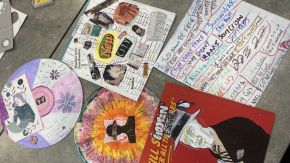
In partnership with Artistic Noise, we support emerging adults who have been arrested in Manhattan by facilitating safe spaces for artistic expression, creativity, and healing as alternatives to typical system responses. Our Brooklyn Justice Initiatives program also gives court-involved people an opportunity to resolve their cases by engaging in creative, therapeutic projects, from planning and designing murals to writing and producing original hip-hop music.
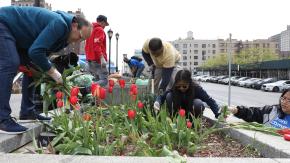
Our Bronx Community Solutions team celebrated Earth Day by planting in the Bronx with community members and partners, TD Bank, and the Arbor Day Foundation.
1,000+ residents attended our youth-led community activations in the Bronx
Reducing Incarceration
Contact with the criminal legal system often inflicts lasting, disproportionate harms on people and communities, making it hard to access housing, find work, and heal—all prerequisites to a fulfilling and productive life. We work within the court system in New York and New Jersey to provide people with opportunities for meaningful change, treating contact with the legal system as an opportunity to address the underlying needs and challenges that often bring people into court. This means not just helping people get back on their feet after an arrest, but extending the support that many have not been able to access in the first place.
The Center was selected by the Mayor’s Office of Criminal Justice to serve as the citywide provider for Project Reset, which gives people accused of low-level charges the chance to avoid court by engaging in meaningful activities, from individual counseling to restorative art workshops. First piloted in just two New York City neighborhoods, the program has helped bring about a paradigm shift in how courts respond to low-level offenses across all five boroughs.
8,500+ new cases in our alternative-to-incarceration programs
7,400+ cases diverted from the legal system through Project Reset as of 2023
Our Brooklyn Justice Initiatives, which celebrated its 10th anniversary this year, has helped thousands of people avoid a criminal record and the harms that come with traditional prosecution by connecting them to support for mental health, jobs, education, and other needs. In New Rochelle, New York, we helped provide these same opportunities to young people through a diversion program for emerging adults who are disconnected from services in the community.
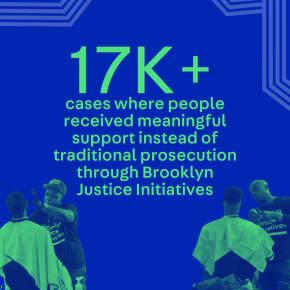
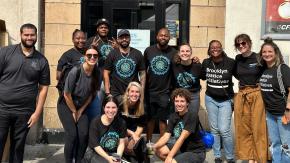
Brooklyn Justice Initiative celebrated their 10th Anniversary in 2023, hosting a community event and T-shirt design contest!
$32,000 in surcharges and fees relieved through Brooklyn Justice Initiatives this year
As one of New York City’s Supervised Release providers, we help keep people out of jail and ensure they make their court appearances as they wait for their cases to be resolved. Our case managers link participants to help for areas of need—from employment to housing to mental health treatment—while working to prevent the profound disruptions and trauma often caused by jail time. More than 800 Supervised Release participants citywide completed our Gender and Family Justice team’s class focusing on unhealthy relationship dynamics and behavioral change for people who have caused harm in their relationships. In June, the city’s overall Supervised Release Program received a $37 million boost in funding, a much-needed investment into this critical alternative to pretrial incarceration.
Not only has mass incarceration done great harm to many communities—especially communities of color—it has also failed to reduce crime. To cultivate lasting safety, we have to offer meaningful opportunities for change to people accused of serious offenses. In partnership with the New York County Supreme Court and up to 200 community-based service providers, our Manhattan Justice Opportunities team creates individualized treatment plans to connect people with felony charges to mental health services, job training, substance use treatment, and a range of other services that set them up for safer, healthier lives in their communities. The Felony Alternative to Incarceration (ATI) Court received $2 million in funding from the Manhattan District Attorney’s Office, as well as critical support from the Office of the Special Narcotics Prosecutor. As of 2023, 179 people have graduated from the Court to have their charges reduced or dismissed in most cases, each avoiding between 2 and 7 years of prison time on average.
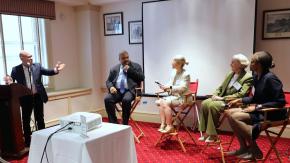
At an event we hosted in partnership with Columbia Justice Lab, Manhattan District Attorney Alvin Bragg joined practitioners, experts, and people who experienced our court program gathered to share insights from our Manhattan Felony Alternative-to-Incarceration Court, which has no restrictions about the charges or needs of the people that can participate. In an accompanying paper, our team shares the research behind this approach—and calls for more passion from reformers to address a wider variety of needs, from employment to family support.
31,900+ Supervised Release participants supported as of 2023
77,600+ check-ins completed with Supervised Release participants this year
350+ years of incarceration avoided through the Felony ATI Court
Preventing Violence
The people and communities most likely to be impacted by violent crime are also those that most often experience the harms of the criminal legal system, creating a vicious cycle in which the root causes of violence go unaddressed. At the Center, we support resident-led initiatives to prevent violence by mediating conflicts, changing group norms, and fostering an overall sense of well-being—in neighborhoods, schools, households, and interpersonal relationships. Our new Justice Scholars Network in Staten Island prevents violence in schools by facilitating restorative discussions for students to voice their concerns and learn to resolve conflicts peacefully. The program also teaches students principles of peacemaking and restorative justice, empowering them to facilitate peaceful conflict resolution among their peers.
Our RISE Project mobilizes neighborhoods to take a stand against intimate partner violence and gun violence through community-driven responses, holistic interventions, and wellness initiatives. During the year, our RISE team hosted six, 12-week courses of New York City’s Respect and Responsibility program for people who cause harm in their relationships. Respect and Responsibility guides individuals through a trauma-informed curriculum rooted in healing, accountability, and transformative justice, while connecting them to services that reduce the likelihood of future harm.
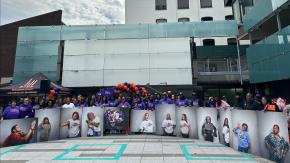
Our Save Our Streets (S.O.S.) programs in Brooklyn and the Bronx send credible messengers—people with first-hand experience of gang and street life—into areas with high rates of gun violence to defuse conflicts before they escalate. The S.O.S. team also offers support for young people with basic needs and life skills, from mental health resources to career workshops. Our violence interruption work in Crown Heights, Brooklyn was featured in a story in News12.
Advancing Systemic Change
Systems and policies meant to promote justice and public safety are too often removed from the people and communities they impact the most, creating more harm instead of addressing real needs. By incorporating the perspectives of people who are directly impacted, studying the effects of policies, and sharing what we learn with communities across the United States and abroad, we help build systems that are responsive and responsible to the people they serve.
Changing Narratives
Policies and practices are shaped by dominant narratives about the challenges facing our communities. We work to ensure that those narratives are informed by data, experience, and the first-hand expertise of those most impacted. Our groundbreaking study of young gun-carriers in Crown Heights, Brooklyn, revealed that young people overwhelmingly carry guns out of fear—for their own lives and the lives of their loved ones. Based on in-depth conversations led by researchers with lived experience in Crown Heights’ street networks, the study countered widespread narratives that most young people carry guns in order to harm others. The study identifies different types of young gun-carriers in Brooklyn, and the findings highlight the need to meet young gun-carriers where they are, recognizing gangs, crews, and street networks as the main sources of identity, loyalty, and decision-making for many young people. Our recommendations point the way towards a collaborative approach to safety—one that offers an alternative to law enforcement, creates spaces for healing, and respects young gun-carriers’ allegiance to their street networks.
2023 marked the 60th anniversary of Gideon v. Wainwright, the Supreme Court decision that gave people experiencing poverty the right to an attorney in criminal cases. The right to public defense is an often overlooked piece of systemic change. With support from Arnold Ventures, we convened a roundtable of leaders and experts to identify strategies for strengthening access to representation, culminating in our policy brief on the cutting edge of public defense work. In a three-part series, our New Thinking podcast explored the potential for a strong public defense system to keep people out of jail and, through eviction prevention, in their homes.
Our Youth Action Institute is a research fellowship that supports young New Yorkers in studying issues that affect their lives and shaping public policy around them. This year, young researchers with the Institute investigated New York City’s guidelines for gender inclusion in public schools and shared their ideas for improving school environments for queer and trans students. Read their recommendations on The Arc.
As part of our work to support survivors of human trafficking, we partnered with Courtney’s House, CATCH Court, rights4girls, and a survivor leader advisory board to launch Project HEAL, a set of leadership and peer support materials for trafficking survivors. The materials, which include curricula for both youth and adults, provide a trauma-informed, supportive framework for programs to encourage survivors to become advocates for change and shape policies that impact other survivors.
We also collaborated with Freedom Reads, the National Book Foundation, and Interabang Books co-owner Lori Feathers to launch the Inside Literary Prize. The first of its kind in the United States, the Inside Literary Prize is a book award judged exclusively by people currently serving prison sentences. 300 people incarcerated across 12 facilities will have a chance to select a winner among four recent books nominated for the award. The initiative is an opportunity for people who are incarcerated to participate in national conversations around literature and the human experience.
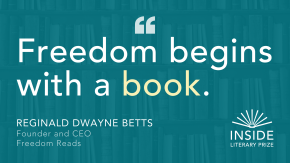
Centering Racial Justice
Advancing racial justice is central to all of our work, whether we are in communities addressing racial disparities in access to housing, health, and employment, or working towards far-reaching systems change. Our national Community Justice team served as the coordinator of the Focused Racial Equity Cohort on the MacArthur Foundation’s Safety and Justice Challenge. This project brings government and community leaders together in four jurisdictions to identify and address the drivers of racial inequities in the legal system and broader community. The Safety and Justice Challenge also supported the award-winning Tap In Center we helped launch in St. Louis County, which offers free, immediate access to a lawyer and connections to local services for people with unresolved court cases as part of a broad effort to reduce racial disparities in the legal system. Since its launch in 2020, the Tap In Center has helped more than 1,000 people potentially stay in their jobs, with their families, and in community-based services instead of facing arrest and jail.
On Juneteenth, our Neighbors in Action team celebrated Black history in Crown Heights, Brooklyn, by paying a visit to the Weeksville Heritage Center. Weeksville, Brooklyn, is a historic settlement, one of the United States’s first free Black communities of the 19th century.
We also work to identify and promote anti-racist policies through our research, studying the effects of practices like mandatory minimum sentences on racial disparities in the prison population. In an op-ed we co-wrote for the New York Daily News, we make a case for doing away with automatic lower limits on prison sentences, showing that these minimums disproportionately impact Black Americans and confer excessive power on prosecutors during plea negotiations.
The Center for Justice Innovation belongs to a broad coalition of reformers working to close the inhumane facilities on Rikers Island. In 2016, we proudly joined the Independent Commission on New York City Criminal Justice and Incarceration Reform—also known as the Lippman Commission—to help develop safe strategies to close down the jail complex. With the launch of a renewed Lippman Commission, New York City will be updating its plans to close down Rikers Island, with an emphasis on expanding support for people with a serious mental illness and addressing case processing delays. With 9 out of 10 people incarcerated on Rikers being Black or Latinx, exposed to intolerable living conditions and often life-threatening violence, closing these facilities is an urgent necessity for racial justice. Our Executive Director Courtney Bryan will join other leaders, researchers, and people with lived experience on the new Lippman Commission to come up with a concrete action plan to put an end to the senseless suffering on Rikers Island.
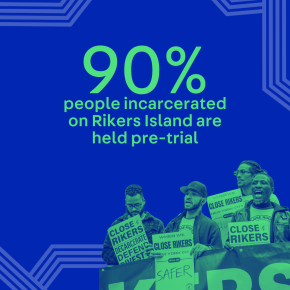
In partnership with the Mayor’s Office of Criminal Justice, we launched a program in October 2023 to safely reduce the number of people awaiting trial on Rikers Island by addressing systemic inefficiencies that lead to unnecessary delays in case resolution. The jail population review initiative identifies alternatives to pretrial detention as soon as possible after an individual’s admission and works with the legal parties to swiftly divert people from jail at the earliest opportunity.
Sparking Change Across the US and Beyond
From better ways of responding to people facing mental health crises to new approaches in treatment courts, we take what works and help replicate it in communities across the country and beyond. Our research and guides offer insights for jurisdictions seeking to better serve their communities. This year, for example, we published Strengthening the Foundation, which examines the evidence behind the treatment court model and explores avenues for further research. Our Gender and Family Justice team also hosted a six-part webinar series on culturally responsive risk assessment tools for cases involving intimate partner violence, which was attended by more than 400 practitioners from around the country.
On the West Coast, our Community Justice team partnered with the Los Angeles City Attorney’s Office to launch the California Prosecutors Restorative Justice Collaborative. The Collaborative is a learning community for prosecutors from 15 offices around the state aiming to create more opportunities for people to resolve their criminal cases through restorative practices. The Community Justice team has also supported Los Angeles County with implementing its Rapid Diversion Program, which offers meaningful pathways out of the legal system for people struggling with mental health challenges.
640 graduates from the Rapid Diversion Program we support in LA through 2023
93% of graduates from the Rapid Diversion Program have no further contact with the legal system
Our Tribal Justice Exchange supports tribal communities in strengthening their justice systems while respecting the inherent sovereignty of each tribal nation. The team released three videos this year to help tribal justice practitioners incorporate trauma-informed approaches to support Native individuals navigating the legal system. We are also working to develop a culturally appropriate risk assessment tool specifically designed for use with Native populations, which will help tribal justice practitioners identify appropriate services and case management for tribal members who are system-involved. The Tribal Justice Exchange is currently piloting the tool with several tribal justice systems, including in pretrial, probation, reentry, and public defense settings.
30+ jurisdictions received guidance from our Treatment Courts team this year
3,000+ people nationally attended our Gender and Family Justice team’s trainings
Although many of the challenges facing justice systems in the United States are unique, many are not; communities abroad also grapple with how best to respond to crime, effectively plan and implement new programs, and measure the success of reforms. We share our expertise in these areas with justice systems around the world, tailoring our guidance to the specific needs of each community we work with. This year, we offered training sessions on crisis de-escalation tactics to court staff in three cities in Kosovo, with participants attending from courts throughout each region. To help strengthen treatment court programs in Mexico, we worked with seven different states to develop models for keeping track of important data and evaluating program success. Based on court observations and workshops we hosted with local judges, we also offered guidance on people-centered approaches to justice to court practitioners in Kyrgyzstan and Georgia.
Financials
July 1, 2022 - June 30, 2023
Total in Expenditures: $89,460,000
